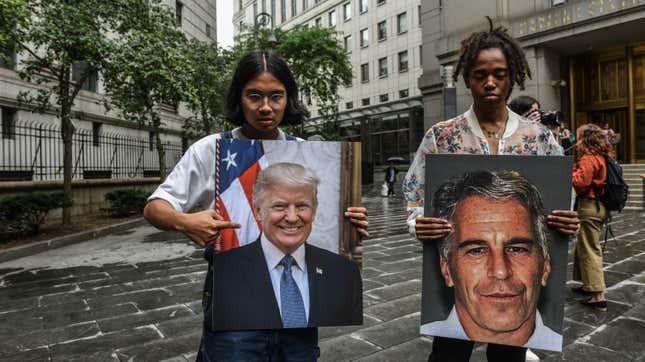Jeffrey Epstein Is a Model Beneficiary of the Good Ol' Boys Club
Latest

Yesterday, New York Magazine reported that Jeffrey Epstein, who is charged with sex trafficking, repeatedly referred women—one of whom came pre-approved by Harvey Weinstein—to work for Charlie Rose, the longtime PBS host accused of sexual harassment by dozens of women. One of those referred women went on to accuse Rose of sexual harassment. A few days earlier, the New York Times reported that within the last few years Forbes.com, the National Review, and HuffPost published articles painting Epstein as “a selfless and forward-thinking philanthropist with an interest in science,” despite his having pled guilty to soliciting a minor for prostitution.
These two stories are not unrelated. They reflect the reality of the good ol’ boys club, which is not just about networking and connecting powerful men to greater power, although it does both. The clubhouse mentality can also create lines of connection between men allegedly abusing their power, facilitate alleged abuse, and conveniently make available a redemptive media narrative. That’s what this latest installment of standout Epstein reporting makes clear: the full potential scope of the boys club.
New York Magazine has published a reported guide to Epstein’s “little black book,” a collection of the financier’s contacts first unearthed by Gawker in 2015 from court proceedings. Within the A-to-Z list, there are plenty of items that demonstrate the leniency Epstein benefited from (for example, Cy Vance Jr., an entry near the end of the list, the New York prosecutor whose office attempted to reduce Epstein’s sex offender status). But an entry on Charlie Rose points to a different benefit: the connections between high-profile men accused of abuse and harassment.
Here we have a networked trifecta of accused men: Harvey Weinstein, Jeffrey Epstein, and Charlie Rose.
Irin Carmon reports on call logs documenting that Epstein and his assistant called Rose dozens of times over the course of a couple years. Some of those calls were about scheduling lunch or tea between the two men, but not infrequently it was to refer an assistant. Carmon writes that Epstein “called with a total of five women’s names and phone numbers.” One of these women was described in a call log as the “world’s most perfect assistant she used to work for Harvey Weinstein he’s lucky if he can get her.” Here we have a networked trifecta of accused men: Harvey Weinstein, Jeffrey Epstein, and Charlie Rose, all intimately connected.
-

-

-

-

-

-

-

-

-

-

-

-

-

-

-

-

-

-

-

-

-

-

-

-

-

-

-

-

-

-

-

-

-

-

-

-

-

-

-

-








































